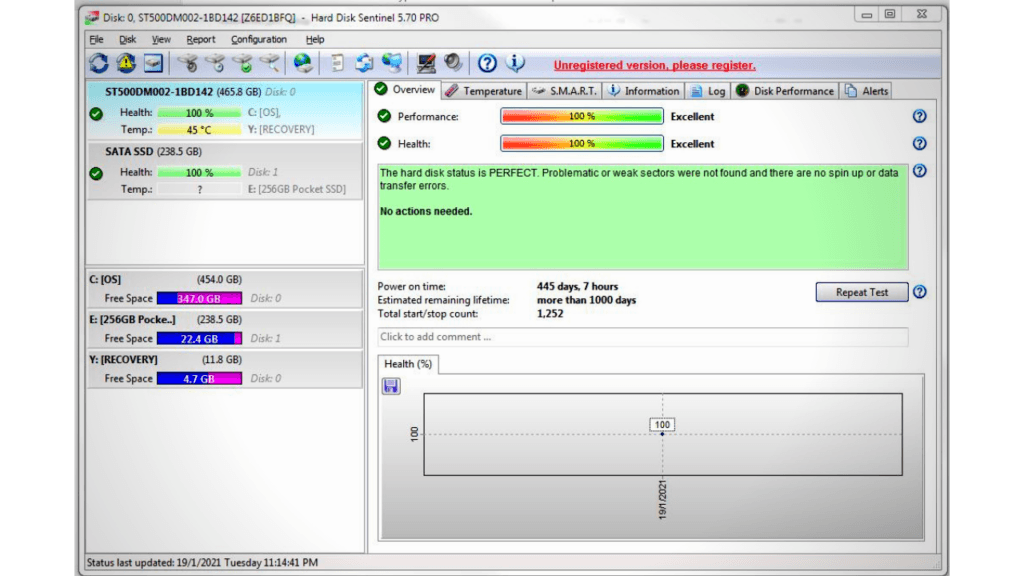

If so, the drive model family may also be printed. Is in the smartmontools database (see '-v' options below). (If drive is has a user protected area reserved, or is "clipped", this may be smaller than the potential maximum drive capacity.) Indicates if the drive If the device supports Logical Block Address mode (LBA mode) print current user drive capacity inīytes. So, whether SMART support is currently enabled or disabled.

Says if the device supports SMART, and if
#Hp ssd health centos serial#
i, -info Prints the device model number, serial number, firmware version, and ATA Standard version/revision information. Information if you are reporting bugs or problems. V, -version, -copyright, -license Prints version, copyright, license, home page and SVN revision information for your copy of smartctl to STDOUT and then exits. SHOW INFORMATION OPTIONS: -h, -help, -usage Prints a usage message to STDOUT and exits. smartctl will execute the corresponding commands in the order: INFORMATION, ENABLE/DISABLE, The options are grouped below into several categories. To distinguish them, the base 16 values are always displayed with a leading "0x", for example: "0xff". Note that the printed output of smartctl displays most numerical values in base 10 (decimal), but some values are displayed in base 16 (hexadecimal). If necessary, the '-d' option can be used to over-ride this guess See '-r ataioctl' below for details.īased on the device path, smartctl will guess the device type (ATA or SCSI). If '-' is specified as the device path, smartctl reads and interprets it's own debug output from standard input. The RAID controllers, not the nodes corresponding to logical drives. ("lsscsi -g" is helpful in determining which scsi generic device node corresponds to which device.) Use the nodes corresponding to For disks accessed via the hpahcisr and hpsa drivers, the device nodes you needĪre "/dev/sg*".
#Hp ssd health centos driver#
The cciss driver the device nodes are of the form "/dev/cciss/cd0". Reading and writing data)! For HP Smart Array RAID controllers, there are three currently supported drivers: cciss, hpsa, and hpahcisr. "/dev/sg" (note that smartmontools interacts with the Areca controllers via a SCSI generic device which is different than the SCSI device used for For disks behind Areca SATA RAID controllers, you need

For disks behind HighPoint RocketRAID controllers you may need "/dev/sd". For SATA disks accessed with libata, use "/dev/sd" and append "-d ata".įor disks behind 3ware controllers you may need "/dev/sd" or "/dev/twe", "/dev/twa" or "/dev/twl": see detailsīelow.

Support use the devices "/dev/nst*" and "/dev/sg*". For SCSI Tape Drives and Changers with TapeAlert Use the forms "/dev/hd" for IDE/ATA devices, and "/dev/sd" for SCSI devices. The command set used by the device is oftenĭerived from the device path but may need help with the '-d' option (for more information see the section on "ATA, SCSI command sets and SAT" below). The user must specify the device to be controlled or interrogated as the final argument to smartctl. Smartctl also provides support for polling TapeAlert messages from SCSI tape drives and changers. Most devices, unimplemented SMART commands issued to a drive are ignored and/or return an error. Smartctl will print a warning message but issue the command anyway (see the -T, -tolerance option below). Note: if the user issues a SMART command that is (apparently) not implemented by the device, Smartctl is a command line utility designed to perform SMART tasks such as printing the SMART self-test and error logs, enabling and disabling SMARTĪutomatic testing, and initiating device self-tests. This version of smartctl is compatible with ATA/ATAPI-7 and earlier standards (see REFERENCES below) The purpose of SMART is to monitor the reliability of the hard drive and predict drive failures, and to carry out different types of drive self-tests. Smartctl controls the Self-Monitoring, Analysis and Reporting Technology (SMART) system built into many ATA-3 and later ATA, IDE and SCSI-3 hardĭrives.


 0 kommentar(er)
0 kommentar(er)
